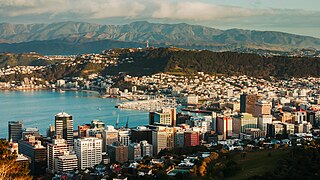
Wellington is the capital city of New Zealand. It is located at the south-western tip of the North Island, between Cook Strait and the Remutaka Range. Wellington is the third-largest city in New Zealand, and is the administrative centre of the Wellington Region. It is the world's southernmost capital of a sovereign state. Wellington features a temperate maritime climate, and is the world's windiest city by average wind speed.

Petone is a large suburb of Lower Hutt, Wellington. It stands at the southern end of the Hutt Valley, on the northern shore of Wellington Harbour.
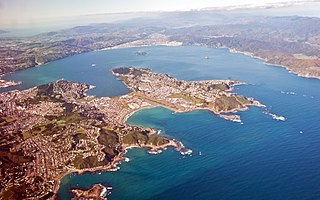
Wellington Harbour, officially called Wellington Harbour / Port Nicholson, is a large natural harbour on the southern tip of New Zealand's North Island. The harbour entrance is from Cook Strait. Central Wellington is located on parts of the western and southern sides of the harbour, and the suburban area of Lower Hutt is to the north and east.

The New Zealand Film Commission is a New Zealand government agency formed to assist with creating and promoting New Zealand films. It was established under the New Zealand Film Commission Act 1978.

Clifford Curtis is a New Zealand actor and film producer. After working in theatre, he made his film debut in Jane Campion's Oscar-winning film The Piano (1993), followed by a breakout role in the drama Once Were Warriors (1994). He has won four New Zealand Film Awards, Best Actor for Jubilee (2000) and The Dark Horse (2014) - which also earned him the Asia Pacific Screen Award - and Best Supporting Actor for Desperate Remedies (1993) and Whale Rider (2002).

Stokes Valley, a major suburb of the city of Lower Hutt in the North Island of New Zealand, lies at the edge of the city, seven kilometres northeast of the city centre. It occupies the valley of a small tributary of the Hutt River, called Stokes Valley Stream, which flows north to meet the main river close to the Taitā Gorge. Stokes Valley takes its name from Robert Stokes, who formed part of the original survey team of 1840 commissioned to plan the city at Thorndon in Wellington.

Stuff Ltd is a privately held news media company operating in New Zealand. It operates Stuff, the country's largest news website, and owns nine daily newspapers, including New Zealand's second and third-highest circulation daily newspapers, The Post and The Press, and the highest circulation weekly, Sunday Star-Times. Magazines published include TV Guide, New Zealand's top-selling weekly magazine. Stuff also owns social media network Neighbourly.

Avalon is a suburb of Lower Hutt, in the Wellington Region of New Zealand. It was formed as a private residential development in the 1970s on land formerly occupied by market-gardens on the left (eastern) bank of the Hutt River. It features mostly California-inspired designed houses, often split-level, with 3 or 4 bedrooms. It also features Avalon Park, one of the biggest playgrounds in Lower Hutt.

Hutt Valley High School is a state coeducational secondary school located in central Lower Hutt, New Zealand. A total of 1916 students from Years 9 to 13 attend the school as of August 2024, making the school one of the largest in the Wellington metropolitan area.

Lloyd David Jones is a New Zealand author. His novel Mister Pip (2006) won the Commonwealth Writers' Prize and was shortlisted for the Booker Prize.
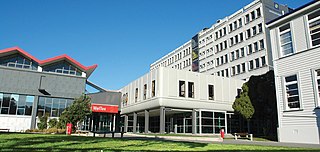
The Wellington Institute of Technology, also known as WelTec, is a New Zealand polytechnic based in Petone, Lower Hutt. WelTec was formed in 2001 by an amalgamation between the Central Institute of Technology and the Hutt Valley Polytechnic In 2020, WelTec, along with 15 other national polytechnics, became subsidiaries of Te Pūkenga – New Zealand Institute of Skills and Technology.
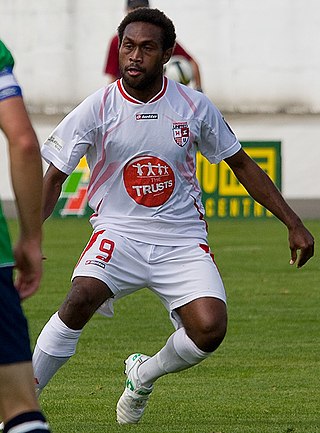
Benjamin Totori is a Solomon Islands footballer who plays as a striker for Kossa. He has played in the United States and New Zealand.

Stephen John Tew is a New Zealand sports administrator. He was the chief executive officer of New Zealand Rugby from 2008 to 2019.

Sir Edward Michael Coulson Fowler was a New Zealand architect and author who served as mayor of Wellington from 1974 to 1983.
Philippa Campbell is a New Zealand film and television producer and the Literary Manager at the Auckland Theatre Company.

Lower Hutt is a city in the Wellington Region of New Zealand. Administered by the Hutt City Council, it is one of the four cities that constitute the Wellington metropolitan area.
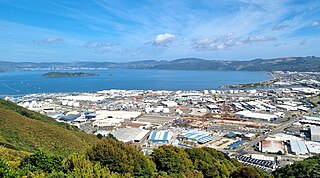
Seaview is an industrial suburb of the city of Lower Hutt, in Wellington, New Zealand. Situated on the eastern coast of the Hutt Valley, the suburb lies between Te Awa Kairangi / the Hutt River and Petone, and the bays of Eastbourne to the south. Seaview is a centre for bulk liquid fuel storage for the lower half of the North Island, and a site for heavy industry. It is also a base for support services for trucks and transportation businesses and the location of the wastewater treatment plant for drainage from the Hutt Valley. Seaview is home to the Port Road Drags, the longest-running street drag races in Australasia.

Daniel Phillip Keat is a former New Zealand footballer who played as a midfielder.

The 2016 Kaikōura earthquake was a 7.8 earthquake in the South Island of New Zealand that occurred two minutes after midnight on 14 November 2016 NZDT. Ruptures occurred on multiple faults and the earthquake has been described as the "most complex earthquake ever studied". It has been subsequently modelled as having a megathrust component set off by an adjacent rupture on the Humps Fault. It was the second largest earthquake in New Zealand since European settlement.
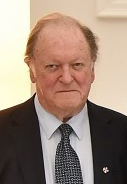
William Newton Sheat was a New Zealand lawyer and arts advocate whose input was instrumental in many arts organisations including as a founding member of the New Zealand Film Commission, Creative New Zealand and Downstage Theatre.



















